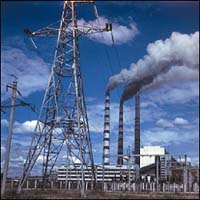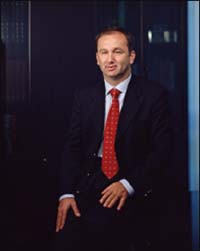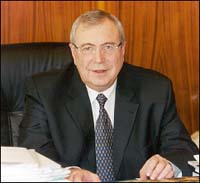 THE POWER SECTORS - OPPORTUNITIES IN EQUIPMENT
THE POWER SECTORS - OPPORTUNITIES IN EQUIPMENT
|
Compared to the oil and gas reforms, the power
industry reforms at first looked easier to accomplish
as the cost of the construction and maintenance
of electric transmission lines and other facilities
is much lower than the transportation costs in
the oil and gas industry. A low share of transportation
costs in electricity cost considerably reduces
the list of technological limitations and should
have simplified the reform of the Russian power
industry, which for long has been monopolized
by the vertically integrated holding company,
United Energy Systems of Russia (UES).

In 2001, the Russian government, as the 51% shareholder
of UES, announced that it will reform and restructure
the monopolist and the electrical power sector
in line with international trends of deregulation.
The reforms entail the creation of a legislative
framework and an infrastructure for a competitive
market, to be completed by 2004; the implementation
of full liberalization of wholesale and retail
electricity markets and the expansion of the competitive
market, to be completed by 2007, and; the privatization
of generating companies and regional energy companies
by 2011.
As in a lot of utility reform processes around
the world, and much to the dismay of investors,
the timeframe and maybe even the entire scheme
looked better on paper than it worked out in practice
in which delays and hundreds of amendments have
been dragging the process. The main discussions
in Russia have been over the distribution of property
in power-generation, the idea of network and marketing
joint-stock companies being formed on the basis
of UES, the need to guarantee the safety of energy
supply, and the regulations of electricity tariffs
between the federal authorities and regions.
Vladimir
Milov, Deputy Minister for Energy, would like
to attract considerable volumes of private investments
into the power sector. Contemplating on the most
effective way to do this, he prioritizes "…the
removal of administrative barriers, such as regulation
in sectors which should be competitive and based
on free prices and a free amount of suppliers…
The second part is that the sector currently exists
of an absolute monopoly situation, which does
not promote economic efficiency. We are now restructuring
these companies to establish new ones, which are
transparent and operate on market-based principles.
This should make it more attractive for investors."

In any case, the electrical power equipment industry
in Russia offers opportunities to foreign investors
due to the significant lack of financing to modernize
products. This impedes the abilities of local
manufacturers to reach international quality standards.
|
However, even though companies with the likes
of Siemens, Westinghouse Electric, General Electricy
and Pratt and Witney are operating in the local
market, Russian companies have consistently gained
strength and market share since 1998. For instance,
Russian Electrotechnics' (RUSEL), producer of
secondary equipment for energy sector, point of
view is very indicative since the company has
good business authority and sufficient market
share. RUSEL was recently named the company of
the year in the category for best industrial applications
manufacturer of the 2001 all-Russian contest organized
by the business weekly "The Company".
According to Nenad
Popovic, RUSEL President and Chairman of the Board
of Directors, "Regarding privatisation
of the energy sector in Russia, the most important
thing is that new shareholders and new investors
will have to invest in the restructuring of power
plants. Therefore, as a producer of secondary
equipment we are an excellent partner for these
investors. In UES there has been little investment
in the past 20 years, so the first thing that
the privatisation will do is encourage investors
to reconstruct and develop new production possibilities.
This is where our secondary equipment will be
necessary, so we expect investment levels to increase
by 5-10 times in the next five years, because
companies will need to re-build, modernise and
compete in a deregulated energy environment".

The Russian government plans to build 25 nuclear
power plants in first half of the 21st century.
The strategy of the Minister of Atomic Energy
is hereby clear. As indicated by Minister Alexander
Rumyantsev, "Amendments to the atomic energy
law have been adopted, which allows us to import
spent fuel into the Russia. The essence of these
changes is that we have obtained support on the
part of Russian producers to supply fresh fuel
to countries worldwide....it has enabled us to
work in the international market with existing
agreements which permitted both the exporting
and importing of spent fuel".
The development in atomic energy looks promising
and the ambitious program looks realistic. The
Minister reports that "...in terms of our
program for atomic sector development, last year
we launched a Nuclear Power Plant in Volgodonsk.
This year, after the reconstruction, we have started
the operation of a block of Nuclear Power Plants
in Kursk. Next year we will start operating yet
another block of Nuclear Power Plants in Kalinin,
and in the coming years we intend to start two
new blocks every three years". Additionally,
important international project for the coming
10 years 'Megatonnes to Megawatts' (for the transfer
of uranium), which represents major investments
between Russia and the US, may be signed by both
governments in May 2003.
|

